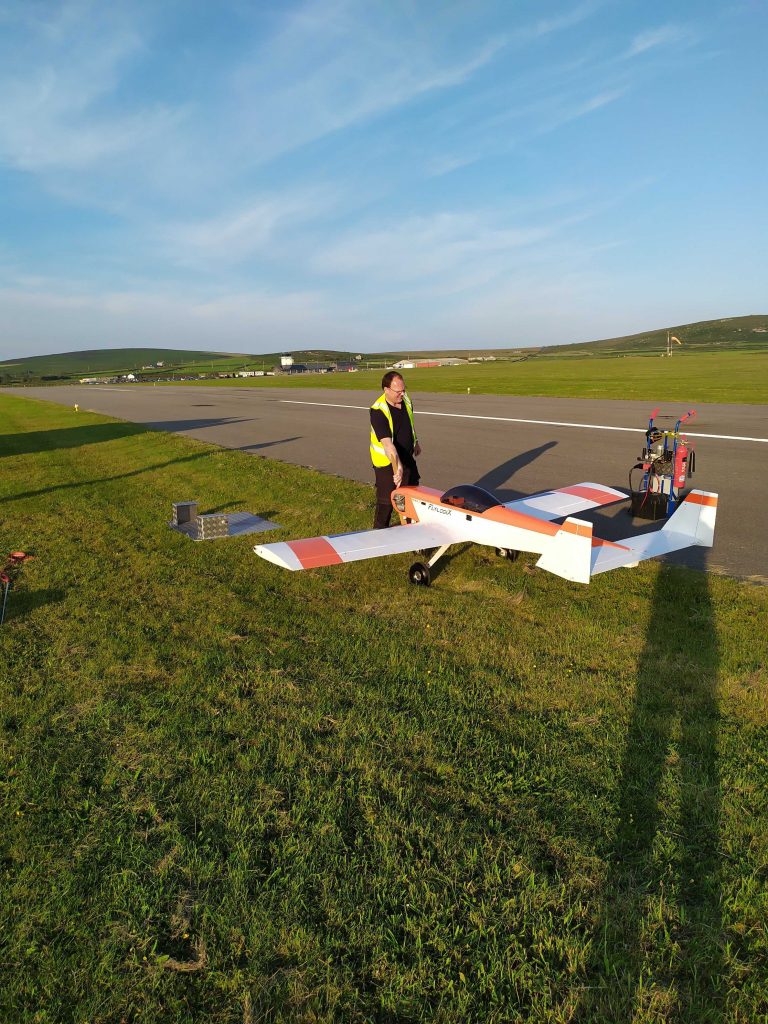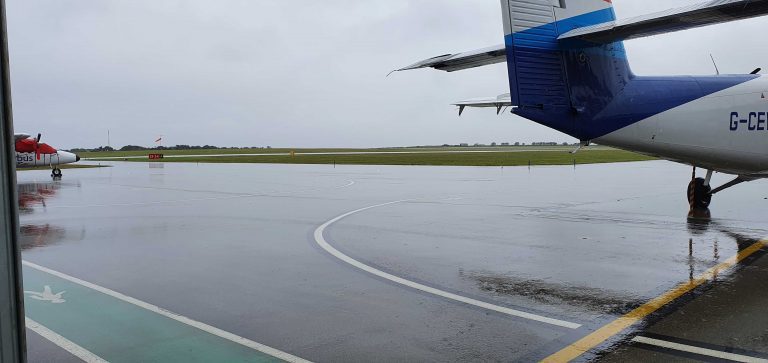The reality of unmanned freight services has taken another step forward with a successful trial of Automatic Take Off and Landing (ATOL) at Land’s End Airport.
Executive Chairman Charles Tavner talks about the trials, the prospect of the Isles of Scilly being able to enjoy next-day delivery, and what it means in terms of the Flylogix vision to see unmanned aviation become the aviation of the future.
“A recent article in The Economist quoted Drone Industry insights, a German research firm, who have predicted that the value of the civilian uncrewed aerial vehicles market will exceed $42 billion by 2025,” says Charles. “I’m not sure if people fully realise how advanced the market is, but it’s fair to say that the next epoch in powered flight is well under way. We’re already pioneering sophisticated, unmanned aircraft, and realizing huge benefits in logistical efficiency and carbon footprint.”

Ex Virgin pilot Steve Rickett walks plane onto runway
“Unmanned flights sound a bit scary, but it’s actually not that far removed from what a commercial jet, with a lot of auto-pilot functions, will be doing for the vast majority of any flight,” says Charles.
“But with Flylogix automation each pilot or controller can supervise much more regular, and more flexible flights. From the technical point of view, it’s very much an 80/20 process for us – we are spending 80 per cent of our time learning about the first and last few minutes of any flight. The trials have been very successful, and we now have proof that we can take-off and land in all weather conditions. That obviously, has a big impact on the scheduling for a regular, daily service.”
“But with Flylogix automation each pilot or controller can supervise much more regular, and more flexible flights. From the technical point of view, it’s very much an 80/20 process for us – we are spending 80 per cent of our time learning about the first and last few minutes of any flight. The trials have been very successful, and we now have proof that we can take-off and land in all weather conditions. That obviously, has a big impact on the scheduling for a regular, daily service.”
“There were several aims of the trial – not just technical, but just as importantly to engage with the community here in the Scilly Isles, and other stakeholders, to find out what is working, what their concerns might be, what we can improve on.”
“So the trials have been just as much about the logistics and the practicalities of becoming a useful value-add to the existing distribution network, and the invaluable consultation work we’ve carried out with local people, to better understand their aspirations for the service.”
December 2020: first unmanned freight flight between two UK commercial airports
Winter 2021: start of 3-month trial of regular flights, with take-off and landing remotely controlled by a pilot
Coming Soon: scheduled launch of regular, daily service
“The concerns people have … safety, of course is number one. But also the Isles of Scilly is an official Area of Outstanding Natural Beauty and greatly dependent on tourism. We feel confident on environmental matters, because carbon emissions from unmanned aviation are up to 98 per cent lower than manned flights. But one of the things we’re modelling is the acceptability of more frequent flights versus larger aircraft, because it’s clear that when people on the islands experience Amazon-style, next-day delivery, for example, that is going to set people’s expectations very high!”
“We’ll continue working very much in partnership with the existing Isles of Scilly freight services to demonstrate that this can add real value to an integrated, efficient supply chain.”

Working In all weathers
“The fundamental premise is that what we do with unmanned aircraft will be different to what you do with a manned aircraft or ship. It’s been important for us to have this discovery phase, where we really listen to the market. It’s very easy these days to develop technology and engineer products that are clever for their own sake, but don’t necessarily fit hand-in-glove with what people need or want. From a ‘product’ point of view, an outcome of the trials should be that the hardware becomes increasingly simple, while the software becomes increasingly sophisticated. That means we will be able to employ local people within the Isles of Scilly to help manage, maintain and prepare the actual aircraft for flight.”
”It’s very easy these days to develop technology and engineer products that are clever for their own sake, but don’t necessarily fit hand-in-glove with what people need or want.
“The Scilly Isles has been the perfect place for us to run these trials for two reasons – firstly because of its unique topography and geography which make unmanned flights a really valuable addition to the whole logistics network. And secondly because it is a microcosm that means everything we learn here, we’ll be able to apply across bigger areas in the future. The eventual aim is for an economically-viable unmanned aircraft freight service, to roll this out to and from other UK airports and ultimately across the whole of Europe.”





